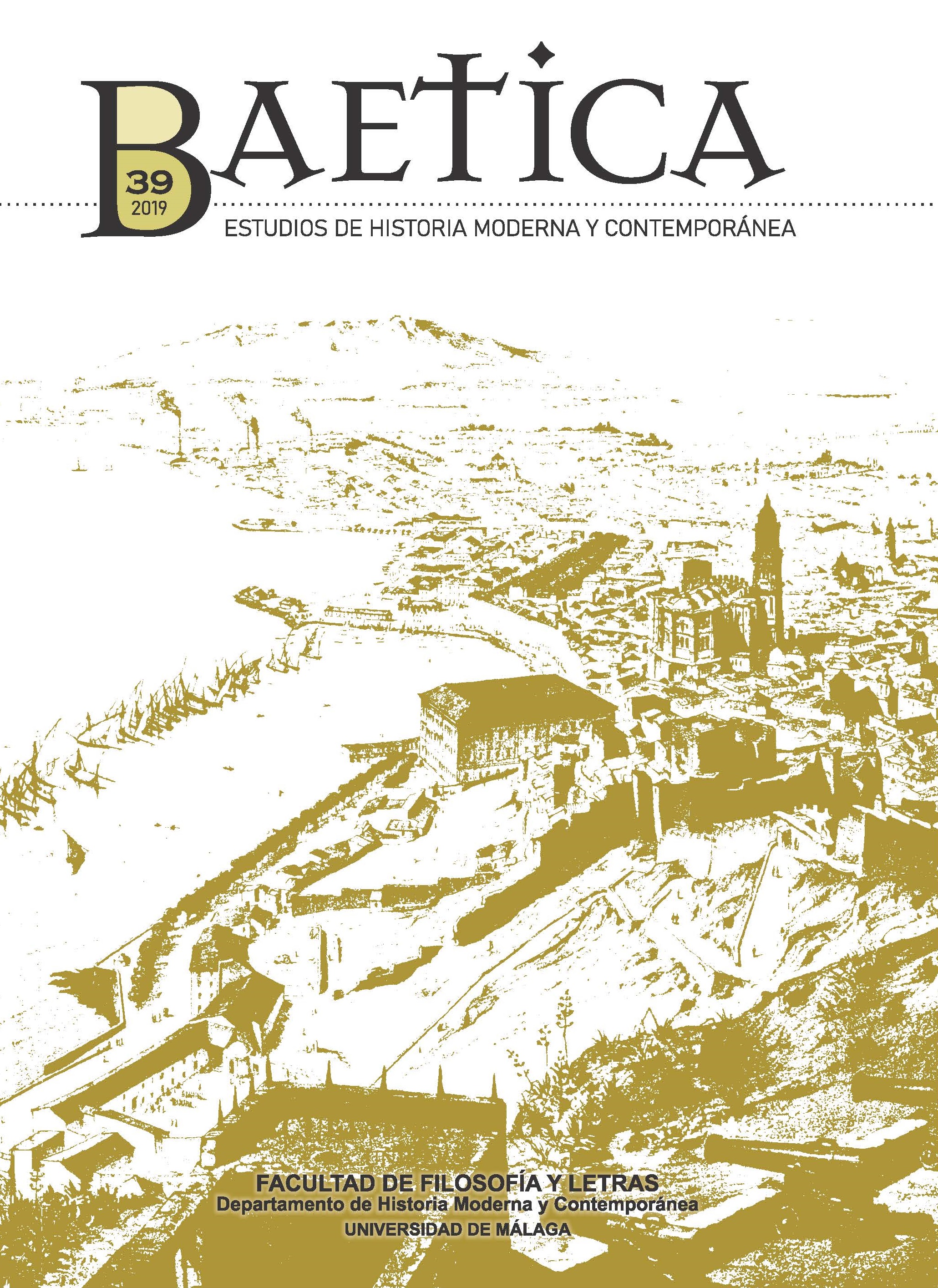Arbitration of the Trade Commerce in Seville (XVIII-XIX centuries)
DOI:
https://doi.org/10.24310/BAETICA.2019.v0i39.7372Keywords:
trade company, commercial codification, conflicts resolution, commercial partnershipAbstract
This article makes an in-deep analysis of commercial law arbitration in Seville during a historical and legal important time such as the codification, from very disperse commercial laws of XVIII century to the single-body Commercial Code of 1829. Several sources checked deny arbitration was just an alternative dispute resolution, therefore, arbitration was compulsory within the commercial system for some company law branches, such as accountability. Otherwise, this paper shows commercial law was not heavily influenced by different laws and legal reforms during XVIII century up to 1868.
Downloads
Metrics
References
ABÁSOLO, Ezequiel (2008-2009), “El código de comercio español de 1829 en los debates y las prácticas jurídicas del extremo sur de América”, Anuario de Historia del Derecho Español, 78-79, pp. 447-460.
CERVANTES BRAVO, Irina (2015), “La justicia alternativa en la Constitución de Cádiz y su influencia en el constitucionalismo mexicano”, en E. A. LÓPEZ SÁNCHEZ y J. L. SOBERANES FERNÁNDEZ (coords.), La constitución de Cádiz de 1812 y su impacto en el occidente novohispano, Universidad Nacional Autónoma de México-Instituto de Investigaciones Jurídicas, México D. F., pp. 153-17.
FERNÁNDEZ DE BUJÁN, Alberto (2011), Derecho público romano: recepción, jurisdicción y arbitraje, Thomson Reuters Civitas, Navarra.
FRANCH BENAVENTE, Ricardo (1986), Crecimiento económico y enriquecimiento burgués en la Valencia del siglo XVIII, Alfons el Magnanim, Valencia.
GONZÁLEZ HUEBRA, Pablo (1867), Curso de Derecho Mercantil, Librería de Sánchez, Madrid.
GROSSI, Paolo (2009), “Note introduttive: vocazione corporativa e vocazione globale del diritto commerciale”, en S. ROSSI y C. STORTI (a cura di), Le matrici del diritto commerciale tra storia e tendenze, Insubria Universtity Press, Bari (Italia), pp. 9-18.
HEREDIA HERRERA, Antonia (1985), “El consulado nuevo de Sevilla y América”, en Actas de las V jornadas de Andalucía y América, Universidad Internacional de Andalucía, La Rábida (Huelva).
HINOJOSA SEGOVIA, Rafael (1991), El recurso de anulación contra los laudos arbitrales, Revista de Derecho Privado, Madrid.
JIMENO-BORRERO, Jesús (2020), La compañía de comercio sevillana entre 1747 y 1848, Diputación Provincial, Sevilla.
ORTEGO GIL, Pedro (1999), “Lo gubernativo y lo contencioso en los consulados borbónicos”, Dereito. Revista Xurídica da Universidade de Santiago de Compostela, 8, 2, pp. 167-201.
MORA CAÑADA, Adela (1988), “El Tribunal del Consulado Tribunal del Consulado de Valencia en el siglo XVIII: conflictos de competencias y legislación aplicable en los procesos”, en Homenaje a Juan Berchamans Vallet de Goytisolo, vol. II, Consejo General del Notariado, Madrid, pp. 629-638.
MARTONE, Luciano (1984), Arbiter-Arbitrator. Forme di giustizia privata nell´etá del diritto commune, Nápoles, pp. 72-127.
PETIT, Carlos (2016), Historia del derecho mercantil, Marcial Pons, Madrid.
– (2013a), “El código de comercio de Sainz de Andino: Algunos antecedentes y bastantes críticas”, Revista de Derecho Mercantil, 289, pp. 109-151.
– (2013b), “El legislador y la biblioteca. Los fondos de Andino en la Universidad de Sevilla”, Glossae, European Journal of Legal History, 10, pp. 489-506.
– (1980), La compañía mercantil bajo las ordenanzas del Consulado de Bilbao 1737-1829, Universidad, Sevilla.
PÉREZ ROYO, Vicente (2016), “El arbitraje en la documentación medieval valenciana. La caracterización de la institución arbitral en la práctica documental de las comarcas de Els Ports y El Maestrat entre 1232 y 1412”, Anuario de Historia del Derecho Español, LXXXVI, pp. 145-195.
VICENTE, José de (1842), Nuevo Manual de Práctica Forense, Imprenta de Omaña, Madrid.
Downloads
Published
How to Cite
Issue
Section
License
This journal provides immediate free access to its content on the principle of making research freely available to the public. All content published in Baetica. Modern and Contemporary History Studies are subject to the Creative Commons Acknowledgment-NoCommercial-ShareAlike 4.0 license, the full text of which can be found at <http://creativecommons.org/licenses/by-nc-sa/4.0>
They may be copied, used, disseminated, transmitted and publicly displayed, provided that:
The authorship and the original source of its publication (magazine, publisher and URL of the work) must be cited.
They are not used for commercial purposes.
The existence and specifications of this use license are mentioned.
Copyrights are of two kinds: moral and patrimonial. Moral rights are perpetual, inalienable, non-transferable, inalienable, unattachable and imprescriptible prerogatives. In accordance with copyright legislation, BAETICA. Estudios de Historia Moderna y Contemporánea recognizes and respects the moral right of the authors, as well as the ownership of the patrimonial right, which will be transferred to the University of Malaga for its open access dissemination. Economic rights refer to the benefits obtained from the use or disclosure of works. BAETICS. Estudios de Historia Moderna y Contemporánea is published in open access and is exclusively authorized to carry out or authorize by any means the use, distribution, disclosure, reproduction, adaptation, translation or transformation of the work.
It is the responsibility of the authors to obtain the necessary permissions of the images that are subject to copyright.
Authors whose contributions are accepted for publication in this journal will retain the non-exclusive right to use their contributions for academic, research, and educational purposes, including self-archiving or deposit in open access repositories of any kind.
The electronic edition of this magazine is edited by the Editorial of the University of Malaga (UmaEditorial), being necessary to cite the source in any partial or total reproduction.







2.png)
